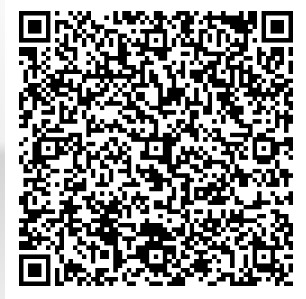Accelerating Decarbonization with ISSES: Carbon Offset Through Renewable Energy Certificates (Recs) and Carbon Credit in Malaysia
At ISSES, we are dedicated to pioneer solutions that help businesses achieve a net-zero future. By seamlessly integrating environmental responsibility into business practices, we support our clients in adopting effective decarbonization and carbon offset strategies. Our mission is to enhance your environmental performance while fostering social responsibility, ensuring long-term sustainability success.
Understanding Renewable Energy Certificates (RECs)
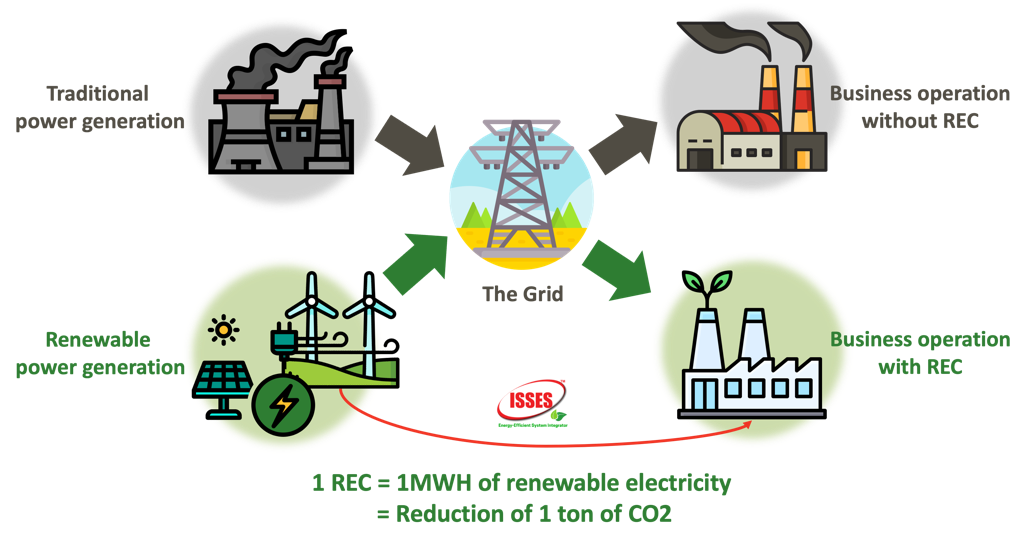
RECs are certificates proving electricity was generated from renewable sources. These tradable instruments prove that one megawatt-hour (MWh) of electricity was generated from a renewable energy source, such as wind, solar, or hydro. By purchasing RECs, businesses and individuals can offset their carbon footprint, support renewable energy projects, and contribute to a cleaner, more sustainable energy future.
This market-based instrument represents the property rights to renewable electricity generation’s environmental, social, and non-power attributes. RECs are issued when one megawatt-hour (MWh) of electricity is generated and delivered to the electricity grid from a renewable energy resource.
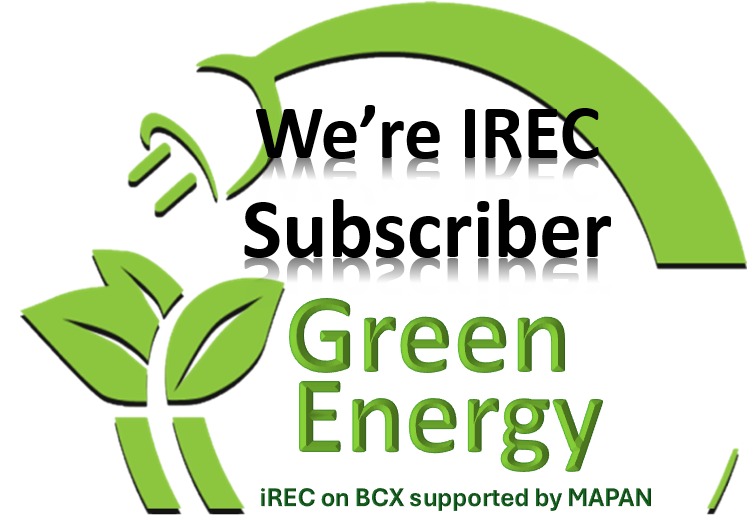
Learn more about How Our Renewable Energy Certificates can help your factory!
How can you use RECs?
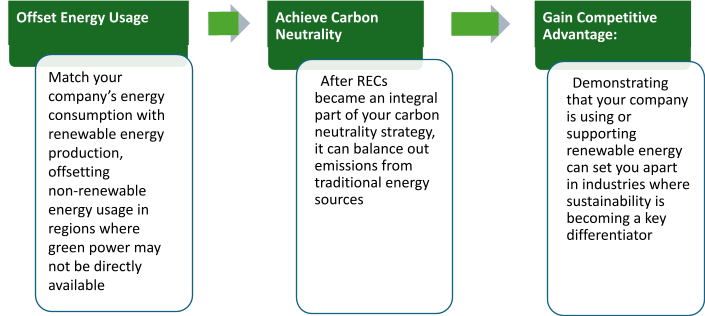

Understanding Carbon Credits
Carbon credits are a financial tool representing a reduction of one ton of carbon dioxide emissions.
They are used to offset emissions and support worldwide environmental projects, typically achieved through reforestation or renewable energy initiatives. Companies can purchase these credits to offset their own emissions and meet environmental regulations or sustainability goals.

How can Carbon Credits benefit you?
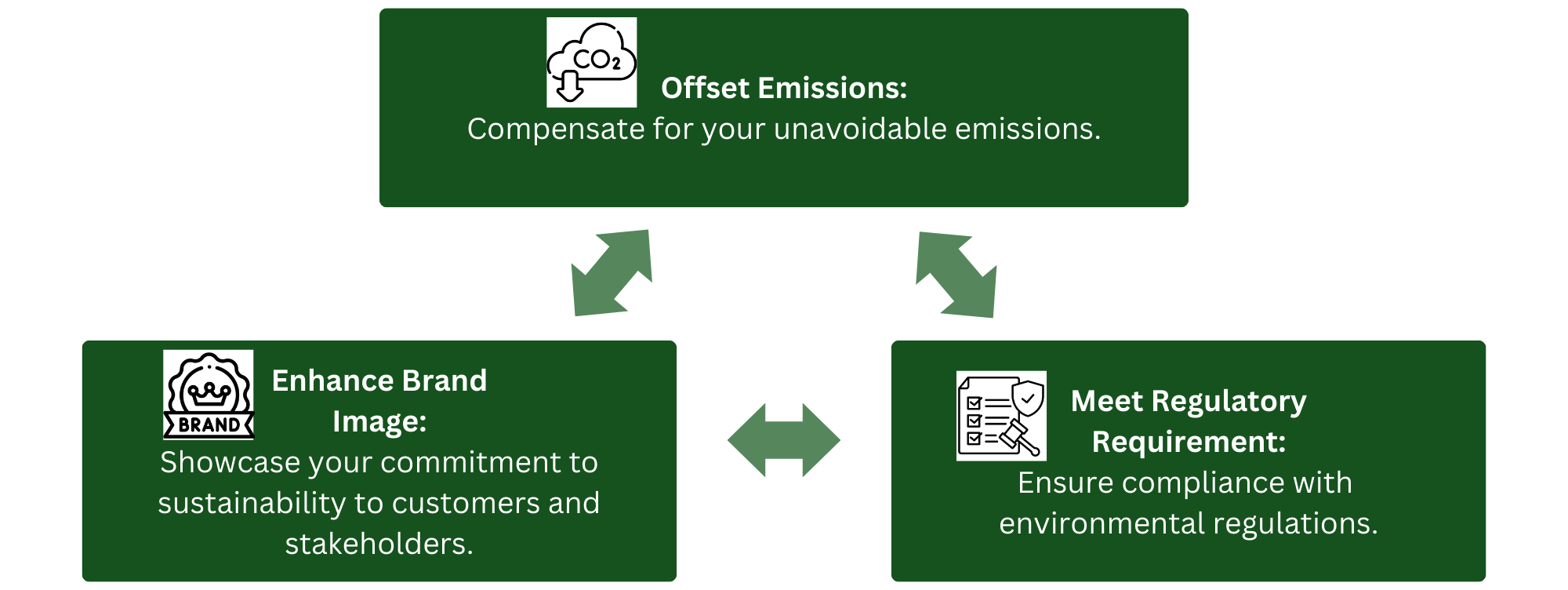

What’s The Difference Between Carbon Credits And Renewable Energy Certificates?
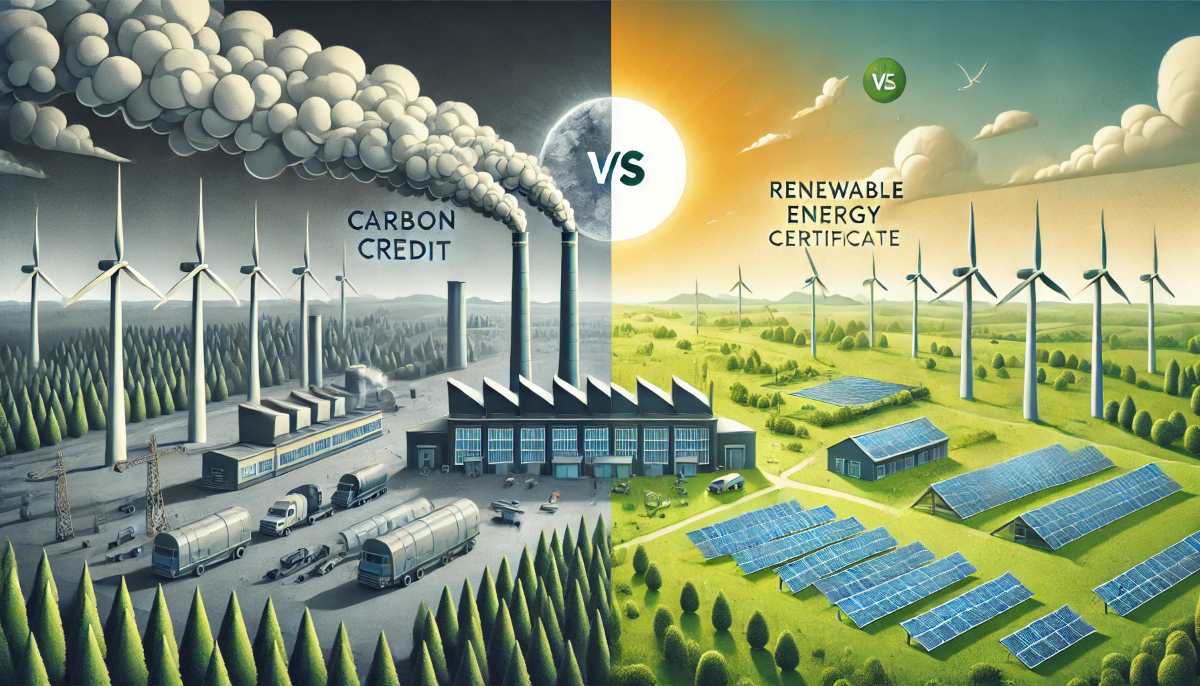

| Characteristics | RECs | Carbon Credits |
| Primary Purpose | Certify that electricity was generated from renewable sources, promoting clean energy | Reduce greenhouse gas emissions by funding projects like reforestation & carbon capture |
| Impact on Carbon Footprint | Indirect impact—contributes to renewable energy adoption | Directly offsets carbon emissions by funding external projects |
| Geographical Scope | Typically tied to local or national grids. | Global—supports emissions reduction projects worldwide |
| Cost | Lower cost | Higher cost due to more significant emissions reduction impact |
| Regulatory Compliance | Help companies meet renewable energy mandates or portfolio standards (e.g., GHG Protocol) | Help companies meet emissions reduction targets or cap-and-trade regulations (e.g., in sectors subject to emissions caps) |
| Best suited for | Companies with renewable energy goals & offset indirect carbon footprint | Companies aiming to offset emissions for carbon neutrality |
| Characteristics | RECs | Carbon Credits |
| Primary Purpose | Certify that electricity was generated from renewable sources, promoting clean energy | Reduce greenhouse gas emissions by funding projects like reforestation & carbon capture |
| Impact on Carbon Footprint | Indirect impact—contributes to renewable energy adoption | Directly offsets carbon emissions by funding external projects |
| Geographical Scope | Typically tied to local or national grids. | Global—supports emissions reduction projects worldwide |
| Cost | Lower cost | Higher cost due to more significant emissions reduction impact |
| Regulatory Compliance | Help companies meet renewable energy mandates or portfolio standards (e.g., GHG Protocol) | Help companies meet emissions reduction targets or cap-and-trade regulations (e.g., in sectors subject to emissions caps) |
| Best suited for | Companies with renewable energy goals & offset indirect carbon footprint | Companies aiming to offset emissions for carbon neutrality |
Frequently Asked Questions Regarding Renewable Energy Certificates and Carbon Credits Malaysia
What is a renewable energy certificate in Malaysia?
In Malaysia, a Renewable Energy Certificate (REC) represents the delivery of 1 MWh of renewable energy generated and delivered to the grid and the associated environmental benefits of displacing 1 MWh of conventional power. While mRECs (Malaysia Renewable Energy Certificates) are not tradable, they can be redeemed/retired by end customers, allowing them to claim the rights to the energy produced from renewable resources. This system aims to increase market demand for renewable energy and provide additional funding for renewable energy developers to expand generation capacity. Regional electricity transmission authorities oversee the integration of renewable energy into the grid to ensure efficient distribution and reliability.
What is the use of a renewable energy certificate?
Renewable Energy Certificates (RECs) serve as a tool to support and incentivize renewable energy development. They represent the environmental attributes of energy produced from renewable resources, allowing companies to purchase RECs to offset their carbon emissions and demonstrate their commitment to sustainability. This benefits both consumers and producers: consumers can contribute to renewable energy adoption and meet sustainability goals related to reducing energy consumption from conventional sources, while producers gain additional revenue from REC sales, making renewable energy projects more financially viable. Institutions such as the National Renewable Energy Laboratory also advance REC mechanisms and promote clean energy markets.
How much is REC in Malaysia?
The price of Renewable Energy Certificates (RECs) in Malaysia can vary depending on supply, demand, and government policies. Currently, mRECs (Malaysia Renewable Energy Certificates) are priced at around 47 MYR per megawatt-hour (equivalent to approximately 5-6 USD per megawatt-hour). These certificates are typically bundled and offered through the mGATS platform to TNB customers, the national utility provider. This pricing helps ensure the accessibility of renewable resources while supporting sustainable energy consumption practices and incentivizing renewable energy generation.
How does a carbon credit work?
Carbon credits represent reducing or removing one tonne of carbon dioxide or its equivalent greenhouse gas from the atmosphere. They are generated through projects that reduce emissions, such as renewable energy projects, reforestation, or energy efficiency initiatives. Companies can purchase these credits to offset emissions, effectively neutralizing their carbon footprint. This market-based approach incentivizes emission reduction and supports sustainable development projects.
Does Malaysia have a carbon tax?
No, Malaysia currently does not have a carbon tax. However, the government has announced plans to introduce a carbon tax on specific energy-intensive industries, such as iron, steel, and energy, starting in 2026. This move is part of Malaysia’s efforts to reduce carbon emissions and transition towards a low-carbon economy.
ISSES’s Comprehensive Solutions
In addition to designing customized, energy-efficient machinery tailored to your industry’s needs, ISSES is committed to helping businesses minimize their carbon footprint. We offer comprehensive solutions, including the provision of Renewable Energy Certificates (RECs) and Carbon Credits, enabling you to achieve your sustainability goals and enhance your environmental impact.
Want to learn more about how we can help your business?
Contact Us to explore your options and take a step toward a greener future!
ISSES’s Comprehensive Solutions
In addition to designing customized, energy-efficient machinery tailored to your industry’s specific needs, ISSES is committed to helping businesses minimize their carbon footprint. We offer comprehensive solutions, including the provision of Renewable Energy Certificates (RECs) and Carbon Credits, enabling you to achieve your sustainability goals and enhance your environmental impact. We are able to help achieve an average of 20% energy savings with our machinery and able to reduce your carbon emissions to net zero.
Want to learn more about how we can help your business?
Contact Us to explore your options and take a step toward a greener future!

Email us

CHAT with us
Whatsapp our sales team to ask more!
We will get back to you as soon as possible.

CONTACT
INFORMATION
Industrial System Supply & Engineering Services Sdn Bhd
No.7, Jalan Melati 2, Seksyen BB 11 Bukit Beruntung, 48300 Rawang, Selangor Darul Ehsan, Malaysia.
Tel. +603 6028 4188
sysam@isses-tech.com
frontdesk@isses-tech.com
CONNECT WITH US
